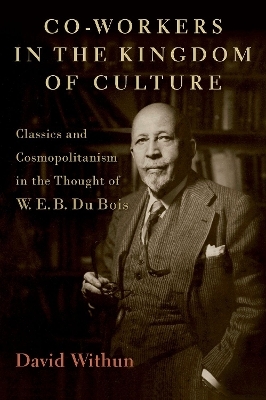
Co-workers in the Kingdom of Culture
Oxford University Press Inc (Verlag)
978-0-19-757958-9 (ISBN)
W. E. B. Du Bois was one of the great African American intellectuals of the early twentieth century. He was a prominent civil rights leader, sociologist, historian, educator, author of several works of fiction, and one of the founding figures of Pan-Africanism. Du Bois's works are filled with allusions to the classical mythology, philosophy, and history that permeated his education. In the first book-length discussion of the topic, David Withun examines the influence of classical authors on Du Bois's thoughts about education, the arts, government, and society. The influence of classical philosophy, particularly that of Plato and Cicero, is apparent in some of Du Bois's most distinctive ideas, such as the concept of the Talented Tenth, his opposition to Booker T. Washington's industrial education, and in his support of propaganda through art.
Withun also explores Du Bois's critique of the classical tradition in his responses to modern racism and colonialism. While Du Bois adopted a number of ideas from the classical tradition, he also used them to critique what he saw as a tradition gone awry. Alongside Du Bois's critique of the classical tradition, he also exhibited an increasing interest in the history--ancient and modern--of Africa and Asia. In his attempts to combat modern prejudice, Du Bois appealed to the long traditions of thought of peoples outside of Europe, in several instances pioneering the research of non-European history. Withun argues that Du Bois's absorption of the classical tradition and simultaneous appreciation of the history of Africa and Asia culminated in a modern cosmopolitanism, one that calls for a more inclusive appreciation of global culture.
David Withun is an educator and historian whose research focuses on topics in historical and contemporary education, the influence of ancient myth and thought in modern literature and philosophy, and the accessibility of the liberal arts for all. He is the founding Head of School at Jacksonville Classical Academy in Jacksonville, Florida.
Acknowledgements
Introduction
Chapter 1: The Classical Education of W. E. B. Du Bois
The Classics and Du Bois's Enduring Moral Vision
Du Bois's High School and College Education
Du Bois's Education at Harvard
Classicism and Pragmatism at Harvard
Du Bois, Santayana, and Platonic Aesthetics
Du Bois Inside and Outside Western Civilization
Conclusion
Chapter 2: American Archias: Cicero, Epic Poetry, and The Souls of Black Folk
Cicero and The Souls of Black Folk
African American History and Epic Poetry
The Autobiography of a Culture Hero
Du Bois's Epic Novels
Citizenship and Humanitas in Du Bois's Thought
Conclusion
Chapter 3: The Influence of Plato on the Thought of W. E. B. Du Bois
Contemporary Context: Plato and Egalitarian Elitism
Sources for Du Bois's Egalitarian Elitism
Du Bois's Commitment to Truth
The Philosopher-Kings and the Talented Tenth
Du Bois and Washington on Civilization and Education
The Talented Tenth and the Message of Black Folk
The Sorrow Songs and the Allegory of the Cave
Marxism and Platonism in Du Bois's Thought
Conclusion
Chapter 4: Anti-Racist Metamorphoses in Du Bois's Classical References
Background: Whiteness and the Classics
A Time Before Race: Ancient Culture as Non-Racial Culture
Black People in Antiquity
Classical Subversion in the African American Tradition
Conclusion
Chapter 5: The History of the "Darker Peoples" of the World: Afrocentrism and Cosmopolitanism in the Later Thought of W. E. B. Du Bois
The Miseducation of the Negro
The Negro and The Star of Ethiopia
The World and Africa
The Unity of the "Darker Peoples"
African in Modern History
"Home" to Africa
Conclusion
Conclusion
Bibliography
Index
| Erscheinungsdatum | 23.03.2022 |
|---|---|
| Zusatzinfo | 14 b/w halftones |
| Verlagsort | New York |
| Sprache | englisch |
| Maße | 251 x 165 mm |
| Gewicht | 499 g |
| Themenwelt | Geisteswissenschaften ► Sprach- / Literaturwissenschaft ► Anglistik / Amerikanistik |
| Geisteswissenschaften ► Sprach- / Literaturwissenschaft ► Literaturwissenschaft | |
| Sozialwissenschaften ► Ethnologie | |
| Sozialwissenschaften ► Soziologie | |
| ISBN-10 | 0-19-757958-2 / 0197579582 |
| ISBN-13 | 978-0-19-757958-9 / 9780197579589 |
| Zustand | Neuware |
| Informationen gemäß Produktsicherheitsverordnung (GPSR) | |
| Haben Sie eine Frage zum Produkt? |
aus dem Bereich


